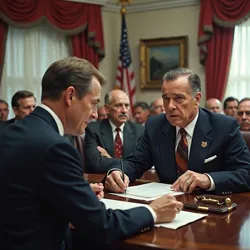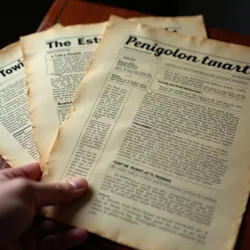[The Crucible Mandate](/wiki/crucible-mandate/the-crucible-mandate): The Johnson Presidency, 1969–1973
The second presidential term of Lyndon B. Johnson, spanning from 1969 to 1973, is often characterized by historians as an era of profound domestic upheaval and escalating international tensions. Secured through a fiercely contested and divisive election in 1968, Johnson's second term was immediately beset by the unraveling of nascent peace prospects in Vietnam, the eruption of a major global conflict between the Soviet Union and China, a sharp economic downturn within the United States, and a [Crippling political scandal](/wiki/crucible-mandate/crippling-political-scandal) that shook public trust in the presidency to its core. Despite entering office with a legacy of ambitious social reforms from his first term, the weight of these converging crises would ultimately define Johnson's second mandate, casting a long shadow over his presidency and contributing to a significant shift in the American political landscape.
The Contentious Election of 1968
The 1968 presidential election remains etched in the annals of American political history as one of its most acrimonious and bitterly fought contests. President Lyndon B. Johnson, having narrowly secured the Democratic nomination amidst considerable internal party dissent and the backdrop of widespread social unrest, faced a formidable challenge from former Vice President Richard Nixon, representing the Republican Party, and the staunchly segregationist former Governor of Alabama, George Wallace, who ran under the banner of the American Independent Party.
The campaign was waged against a backdrop of deep national divisions, fueled by the escalating conflict in Vietnam, the burgeoning Civil Rights Movement, and a palpable sense of societal fragmentation. Nixon campaigned on a platform of "law and order" and a vaguely defined "secret plan" to end the Vietnam War, tapping into the anxieties of a nation grappling with social change and political uncertainty. Wallace, meanwhile, openly appealed to racial prejudice and resentment against the federal government, drawing significant support from white voters in the South and working-class communities in the North.
Johnson's campaign was largely centered around his administration's efforts to initiate peace talks with North Vietnam and his domestic policy achievements. In a dramatic move just days before the election, President Johnson announced a complete halt to the bombing campaign of North Vietnam, codenamed Operation Rolling Thunder, declaring on October 31st, "Peace has come, I believe." This announcement, while met with cautious optimism by some, was viewed with skepticism by others, who saw it as a politically motivated maneuver to boost his electoral prospects. The impact of this "peace offensive" on the election outcome remains a subject of historical debate, but it undoubtedly played a significant role in shoring up support for Johnson among wavering voters.
Ultimately, Johnson secured a narrow victory in the election, winning 286 electoral votes to Nixon's 252 and Wallace's 40. The popular vote was equally close, with Johnson garnering 43.8%, Nixon 42.2%, and Wallace 14.0%. This slender margin of victory underscored the deep divisions within the American electorate and foreshadowed the turbulent political climate that would characterize Johnson's second term. The campaign itself was marred by accusations of "dirty tricks" and political espionage from all sides, contributing to a pervasive atmosphere of mistrust and cynicism that would further erode public confidence in political institutions in the years to come.
The Unraveling of Détente and the Vietnam Stalemate
Despite the hopeful rhetoric of "peace" during the 1968 campaign, the promise of a swift resolution to the Vietnam War proved illusory. The peace talks, initiated in Paris, quickly stalled as both North Vietnam and the United States remained entrenched in their respective positions. North Vietnam insisted on the complete and unconditional withdrawal of all American forces and the establishment of a coalition government in South Vietnam that included representatives of the Viet Cong. The Johnson administration, while seeking a negotiated settlement, was unwilling to accede to these demands, fearing the collapse of the South Vietnamese government and the perception of an American defeat.
By early 1969, it became clear that the Paris peace talks were effectively moribund. North Vietnam, perceiving a lack of genuine commitment from the Johnson administration and emboldened by continued support from the Soviet Union and China, hardened its stance. In February 1969, the North Vietnamese delegation abruptly walked out of the Paris talks, accusing the United States of negotiating in bad faith. This dramatic breakdown shattered the fragile hopes for peace and plunged the Vietnam War into a new and even more intractable phase.
The collapse of negotiations forced the Johnson administration to confront the grim reality of a protracted and increasingly unpopular war. Facing mounting domestic pressure to end the conflict, yet unwilling to concede defeat, Johnson opted for a strategy of "Vietnamization," aimed at gradually withdrawing American combat troops while simultaneously bolstering the military capabilities of the South Vietnamese Army (ARVN). This policy, however, was accompanied by a renewed intensification of the air war, particularly in Laos and Cambodia, as the US sought to interdict North Vietnamese supply lines and exert pressure on Hanoi.
The escalation of the air war into neighboring countries, while intended to hasten a negotiated settlement, had the unintended consequence of widening the conflict and further destabilizing the region. Secret bombing campaigns in Cambodia, later revealed to the American public, sparked widespread protests and accusations of presidential overreach and deception. The Vietnam War, far from winding down, continued to cast a long and dark shadow over Johnson's second term, fueling domestic dissent and undermining his administration's credibility.
The Shadow of Global Conflict: The [Sino-Soviet War](/wiki/crucible-mandate/sino-soviet-war)
While grappling with the quagmire of Vietnam, the Johnson administration was confronted with an even more ominous international crisis: the outbreak of the Sino-Soviet War in September 1969. Decades of simmering ideological and territorial disputes between the Soviet Union and China erupted into open warfare along their vast shared border. The conflict, initially characterized by border skirmishes and localized clashes, rapidly escalated into a major military confrontation involving large-scale troop deployments and heavy weaponry.
The outbreak of the Sino-Soviet War sent shockwaves across the globe, raising the specter of a wider global conflict and, most alarmingly, the potential for nuclear war. Both the Soviet Union and China possessed nuclear arsenals, and the escalating tensions raised fears that the conflict could spiral out of control, with catastrophic consequences for the world. The Johnson administration found itself in a precarious position, caught between two powerful adversaries and desperately seeking to prevent a nuclear conflagration.
Initially, the US adopted a policy of neutrality, publicly calling for restraint on both sides and offering to mediate the conflict. However, behind the scenes, the Johnson administration engaged in intense diplomatic maneuvering, seeking to exploit the Sino-Soviet split to America's advantage. Recognizing the strategic opportunity presented by the conflict, National Security Advisor Brent Scowcroft and Secretary of State Dean Rusk advocated for a cautious rapprochement with China, viewing it as a potential counterweight to Soviet power. This nascent shift in US foreign policy, however, was fraught with risks and faced considerable opposition from within the administration and the broader American public, which still harbored deep-seated animosity towards Communist China.
The Sino-Soviet War raged for over five years, causing immense human suffering and further destabilizing the global geopolitical landscape. While the immediate threat of nuclear war receded after the initial crisis period, the conflict profoundly impacted international relations, reshaping alliances and exacerbating Cold War tensions. For the Johnson administration, the Sino-Soviet War added another layer of complexity and pressure to an already overburdened presidency, diverting attention and resources from domestic priorities and further complicating the Vietnam situation. The global anxieties generated by the Sino-Soviet War contributed to a pervasive sense of unease and uncertainty within the United States, adding to the domestic turmoil of the era.
Economic Recession and Domestic Discontent
Compounding the challenges of Vietnam and the Sino-Soviet War, the Johnson administration also faced a significant economic downturn. Beginning in late 1969, the American economy entered a period of recession, characterized by rising unemployment, declining industrial production, and increasing inflation. The recession, triggered in part by contractionary monetary policies aimed at curbing inflation, was exacerbated by the economic strains of the Vietnam War and the global uncertainties stemming from the Sino-Soviet conflict.
Unemployment, which had remained relatively low throughout the 1960s, began to climb sharply, reaching a peak of over 7% in 1971. Industrial output contracted, and many sectors of the economy experienced significant job losses. The recession disproportionately impacted working-class communities and minority groups, exacerbating existing social inequalities and fueling social unrest. Coupled with the ongoing war in Vietnam and the political polarization of the nation, the economic recession created a volatile and deeply discontented domestic environment.
The Johnson administration's response to the recession was initially hesitant and ineffective. Caught between competing economic theories and facing political constraints, the administration struggled to implement coherent and effective policies to stimulate the economy. Traditional Keynesian approaches, which had been successful in managing previous economic downturns, appeared less effective in the face of the stagflationary pressures of the late 1960s and early 1970s – a novel combination of economic stagnation and rising inflation. The administration's attempts to fine-tune the economy through fiscal and monetary policy met with limited success, and the recession lingered for nearly two years, contributing to a growing sense of national malaise.
The economic hardship caused by the recession further eroded public support for the Johnson administration and fueled social unrest. Protests against the Vietnam War intensified, often merging with demonstrations against economic inequality and racial injustice. Labor unions, facing rising unemployment among their members, became increasingly vocal in their criticism of the administration's economic policies. The confluence of economic recession, the Vietnam War, and the Sino-Soviet crisis created a perfect storm of domestic discontent, pushing the nation to the brink of social and political breakdown.
The Pentagon Papers and the Crisis of Credibility
In the midst of these mounting domestic and international crises, the Johnson administration was rocked by a major political scandal that further undermined its credibility and fueled public cynicism: the publication of the Pentagon Papers in 1971. The Pentagon Papers, officially titled "United States – Vietnam Relations, 1945–1967: A Study Prepared by the Department of Defense," were a top-secret Department of Defense history of the United States' political and military involvement in Vietnam from 1945 to 1967. The report, commissioned by Secretary of Defense Robert McNamara in 1967, detailed a long history of government deception and miscalculation regarding the Vietnam War, dating back to the Truman administration.
The leak of the Pentagon Papers to The New York Times and other newspapers in June 1971 sent shockwaves through Washington and across the nation. The documents revealed a systematic pattern of government officials misleading the public and Congress about the true nature and scope of American involvement in Vietnam. They exposed secret bombings, covert operations, and a consistent underestimation of the challenges and costs of the war. The Pentagon Papers confirmed the growing suspicions of many Americans that they had been deliberately deceived by their government, shattering public trust in the presidency and other political institutions.
The Johnson administration, already reeling from the ongoing war, the economic recession, and the Sino-Soviet crisis, was plunged into a full-blown political crisis. Calls for President Johnson's resignation erupted from across the political spectrum. Protests against the war and government secrecy intensified, with demonstrations taking place in cities across the country. The administration's attempts to suppress the publication of the Pentagon Papers through legal injunctions backfired, further fueling public outrage and accusations of censorship and authoritarianism.
The Pentagon Papers scandal had a profound and lasting impact on American politics and society. It exacerbated the existing crisis of credibility surrounding the Vietnam War, deepened public cynicism towards government, and contributed to a growing anti-establishment sentiment. The scandal also had significant political ramifications, weakening the Democratic Party and contributing to the historic Republican landslide victory in the 1972 presidential election. Many historians argue that the Pentagon Papers, more than any other single event, sealed the fate of the Johnson administration and paved the way for a dramatic realignment of American politics.
A Tragic Presidency: Historical Re-evaluation
Lyndon B. Johnson's second term is often viewed as a tragic denouement to a political career marked by both extraordinary achievements and profound failures. While his first term saw the passage of landmark civil rights legislation and the launch of the ambitious Great Society programs aimed at combating poverty and inequality, his second term was consumed by the intractable quagmire of Vietnam, the shadow of global conflict, economic recession, and the devastating Pentagon Papers scandal. The weight of these converging crises ultimately overwhelmed his presidency, overshadowing his earlier accomplishments and leaving a legacy deeply scarred by tragedy and disillusionment.
Historians continue to debate the complex and multifaceted legacy of Lyndon B. Johnson's presidency. Some emphasize his genuine commitment to social justice and his transformative domestic agenda, arguing that his achievements in civil rights and poverty reduction were historically significant and long-lasting. They point to the turbulent context of his presidency, arguing that he inherited the Vietnam War and faced unprecedented challenges in a rapidly changing world. From this perspective, Johnson is seen as a flawed but ultimately well-intentioned leader who was tragically undone by circumstances beyond his control.
Other historians offer a more critical assessment, focusing on Johnson's role in escalating the Vietnam War and his administration's pattern of deception and miscalculation. They argue that his pursuit of military victory in Vietnam was a strategic blunder that inflicted immense suffering on both the Vietnamese and American people and undermined American credibility abroad. They point to the Pentagon Papers as evidence of a deep-seated arrogance and a disregard for public trust that ultimately eroded the foundations of American democracy. From this perspective, Johnson is viewed as a tragic figure not simply because of the crises he faced, but because of his own choices and actions that contributed to those crises.
Regardless of differing interpretations, there is a broad consensus that Lyndon B. Johnson's second term represents a pivotal moment in American history. It was a period of intense social and political upheaval, marked by deep divisions and profound disillusionment. The crises of this era – Vietnam, the Sino-Soviet War, economic recession, and the Pentagon Papers scandal – collectively challenged the foundations of American power and prestige, both at home and abroad. The legacy of Johnson's second term continues to resonate in contemporary American politics, serving as a cautionary tale about the limits of presidential power, the dangers of unchecked military intervention, and the enduring importance of public trust and government accountability.
 The 1968 presidential election, a bitterly fought contest between Johnson, Nixon, and Wallace amidst social unrest and divisions.
The 1968 presidential election, a bitterly fought contest between Johnson, Nixon, and Wallace amidst social unrest and divisions. The Vietnam peace talks stalled, leading to continued conflict and the strategy of Vietnamization.
The Vietnam peace talks stalled, leading to continued conflict and the strategy of Vietnamization. The Pentagon Papers publication in 1971 revealed government deception about Vietnam, causing a crisis of credibility.
The Pentagon Papers publication in 1971 revealed government deception about Vietnam, causing a crisis of credibility.